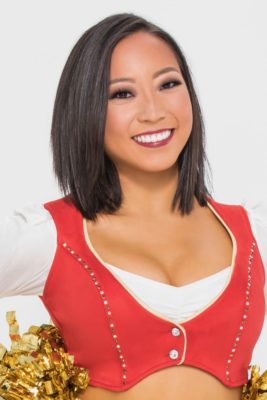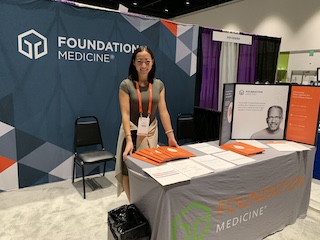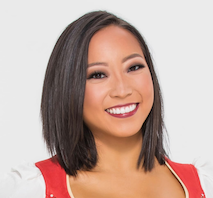
Photo Credit: San Francisco 49ers
Hello, Science Cheerleader fans! As part of NFL Playoff season, we are interviewing some of the current professional cheerleaders who are cheering their teams in the playoffs while also pursuing science, technology, engineering, and math (STEM) careers. Read on to learn more about Emily, a diagnostic medical sonographer and member of the San Francisco 49ers Gold Rush Cheerleaders squad.
What turned you on to STEM and when?
I loved science ever since I was in elementary school. The first time I became fascinated by the subject was when we worked on a school project where we had to use a potato, wires, and nails to turn on a lightbulb. I thought it was so cool! I then had thought I wanted to be an astronaut as I fell in love with outer space and the stars/planets. As I got older and continued to learn all about the different fields of science, I knew for a fact I had a passion for it. During my college years was when I had realized I wanted to immerse myself within the health sciences industry to help improve and make a direct impact on human health.
Why did you try out to be a cheerleader?
I auditioned for the San Francisco 49ers Gold Rush Cheerleaders because alongside science, dancing was my other biggest passion. I grew up dancing competitively at a studio and then transitioned to dancing competitively on my high school’s dance team. Dance was a huge part of my life and really helped shape who I am today. Dancing was always a fantastic outlet for me growing up. I was able express myself in ways words couldn’t. I was able to meet a great group of friends who shared many of the same interests as me, as well as those who were quite different from me. I was able to learn the importance of perseverance and what it took to succeed as a team. I loved the experience so much, however, at the start of my college career, I had many other responsibilities on my plate where I had to take a break from dancing. When I graduated and started my first full-time job in the San Francisco Bay Area after moving from Minnesota, auditioning for the Gold Rush was the perfect opportunity for me to get more involved in the community, a chance to meet an incredible group of women, and ultimately get back into what I always loved doing.

Photo Credit: San Francisco 49ers
How would you describe what you do?
I am an Associate Account Executive with Foundation Medicine, which is a molecular diagnostics company for cancer patients. Our main test that we offer is a companion diagnostic, which is a test that is used in companion with a specific therapy to determine its applicability to a specific patient. In short, no two cancer patients are exactly alike—their genomic makeup is different, thus they may respond to therapies differently. This is why it is essential for patients to use a companion diagnostic to identify the specific genomic mutations, alterations, and other biomarkers they may have (found in either a tissue or blood sample), which will confirm which therapies they will best respond to. Additionally, we also inform patients of clinical trials they could be eligible for based on the types of mutations found in their cancer. Foundation Medicine genomic tests use Next-Generation Sequencing (NGS) that can identify mutations, alterations, and biomarkers found in hundreds of cancer-related genes. I work remotely and cover the San Francisco and Northern Los Angeles regions. I am responsible for executing business plans to strategize sales growth and meet territory goals. I’m traveling about 75% of the time, visiting my accounts and resolving any questions or issues they may be experiencing, building and maintaining strong relationships, and spreading awareness of our tests and services to oncologists and patients. The main goal of my work is to help cancer patients choose the best therapy according to their unique genomic makeup to improve their overall prognosis. As a company, we are continuing to revolutionize personalized medicine and helping patients make more informed treatment decisions.
What does it mean for you to be practicing in STEM?
To me, practicing in STEM means making a difference. A big part of the reason why I was so intrigued by this field of study was because I knew how impactful it was to our society. I have an inherent desire to help and support others, which is why I chose my specific career path. Comprehensive genomic profiling/personalized medicine has come such a far way within the past 10 years, and it really is such an exciting time for this industry—the science is truly incredible and it is continuously growing and improving. As cancer being the second leading cause of death in the United States, transforming cancer care and improving outcomes for millions of affected patients is crucial.
How do the qualities that make you a great cheerleader benefit you in your STEM career?
The qualities that make me a great cheerleader have benefited my STEM career in countless ways. The top two qualities that have helped me the most in both cheering and my STEM career are being positive and motivated. With cheering, we need to be positive and motivated to not only pump up the fans at football games, but to also ensure that it shows in our dance performance. There is a big difference between doing the choreography and performing the choreography—having a positive and motivated mindset undoubtedly helps with the performance aspect. With my STEM career, I am constantly working with customers whether they are oncologists, pathologists, surgeons, PAs, nurses, patients, etc. My customers rely on me for support, and it is extremely important for me to ensure that my customers are happy. It is important that I educate my customers accordingly, stay up to date with the marketlandscape, and be a reliable resource by bringing value. I am responsible for increasing the number of tests that are being used and I need to ensure that I’m creating and maintaining strong relationships with my accounts. Without having a positive and motivated mindset, it would be very difficult to be able to succeed in this position because it is a very competitive environment along with the work itself being challenging and demanding.
How do you feel about breaking down negative stereotypes about cheerleaders?
Fortunately, I haven’t been in a situation in my career where I’ve had to challenge a stereotype being a cheerleader or woman in the STEM field. All my current and former colleagues have been nothing but supportive of my cheerleading. They find it astonishing and inspiring that I can balance it with my full-time job. Although negative stereotypes surrounding cheerleaders are still apparent, I believe that the best way to break down these stereotypes is to spread awareness (like this!) to allow the public to know more and understand us better. As Aristotle famously said, “The more you know, the more you realize you don’t know.”
Best cheerleading experience?
The best cheerleading experience I’ve had so far was cheering at my first NFL game. The feeling of walking on the field for the first time surrounded by thousands of fans is such a surreal experience—I will never forget it! Having danced on many different grounds, I will say there is nothing like dancing on an NFL field.
Best science/health-related experience?
The best science/health-related experience I’ve had so far was speaking directly with patients who had our test done. The patients I had spoken with were all so grateful for the information that was provided to them about their cancer and expressed that it truly saved their lives. They were so thankful for myself and everyone else they had spoken with at my company during their testing journey. They had said we were all so helpful, patient, and caring. It really makes a difference hearing feedback like this directly from patients themselves knowing that they felt like they were in good hands—trusting our test and our team.
What advice would you give your 12-year-old self?
As cheesy as it sounds, I would tell my 12-year-old self to never give up on your dreams. If you have the passion and motivation, go for it and don’t tell yourself otherwise. Even if you fail along the way, don’t let that stop you. Learn from it and grow. Some doors may close, but there will always be another door that opens. Overcoming challenges makes you stronger… getting where you want to be isn’t easy, but when you get there, you’ll be fulfilled.
What’s one thing people might find especially surprising about you?
One thing people might find surprising about me is that I was adopted from South Korea when I was 5 months old. I was raised by my amazing adoptive family in Minnesota and have one older sister who is also adopted from South Korea.

